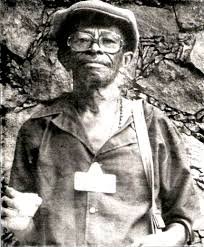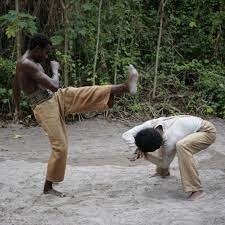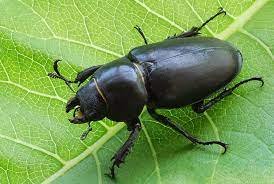Besouro Mangangá





The Legend of Besouro de Mangangá
Early Life and Background
Besouro de Mangangá, whose real name was Manoel Henrique Pereira, was born in 1895 in Santo Amaro, Bahia, Brazil. Besouro, the son of an ex-slave, grew up when Capoeira was both a form of resistance and a way of life for many Afro-Brazilians. The art form, initially developed by enslaved Africans in Brazil, was a means of survival, self-defence, and cultural preservation.
From a young age, Besouro was immersed in the world of Capoeira. He learned the art from Mestre Alípio and other prominent mestres. His agility, strength, and skill quickly earned him a reputation as a formidable capoeirista. But his daring and defiance against oppression truly set him apart.
The Myth of the Beetle
The name "Besouro" (Portuguese for beetle) was not merely a nickname but a symbol of his legendary prowess. According to folklore, Besouro was believed to possess supernatural abilities that allowed him to transform into a beetle and escape danger. This myth was likely fueled by his uncanny ability to evade capture and survive encounters that would have been fatal for most people.
His full nickname, "Besouro Mangangá," refers to a specific type of beetle known for its resilience and tenacity. The stories of his escapades, where he seemingly disappeared or transformed to evade the authorities, contributed to his charisma and reinforced the notion that he was invincible.
Resistance and Rebellion
Besouro's life was marked by resistance against the systemic racism and oppression faced by Afro-Brazilians. Capoeira was criminalised in the early 20th century, and those caught practising it were often brutally punished. Besouro, however, refused to bow to these oppressive laws. He was known for confronting the police and plantation owners, standing up for his community and fighting for justice.
One of the most famous stories about Besouro involves his clash with a local police officer known for his brutality. According to legend, Besouro defeated the officer in a fight, further cementing his status as a folk hero. His acts of defiance made him a target for the authorities, but his ability to elude capture only enhanced his legend.
The Legacy of Besouro de Mangangá
Besouro de Mangangá's life came to a tragic end in 1924 when he was reportedly ambushed and killed by the police. Despite his death, his legacy lives on through the countless stories, songs, and practices of Capoeira that celebrate his life and spirit.
Today, Besouro is revered not only as a master of Capoeira but also as a symbol of resistance and resilience. His story is taught to new generations of capoeiristas, who strive to embody the same courage and skill that Besouro demonstrated. His life and legend are commemorated in various cultural expressions, including movies, literature, and music.
Cultural Impact and Modern Interpretations
In modern times, Besouro's influence extends beyond Capoeira into broader Brazilian culture. He has been the subject of books, films, and documentaries that explore his life and the socio-political context in which he lived. For instance, the 2009 Brazilian film "Besouro", directed by João Daniel Tikhomiroff, portrays his life and the mystical aspects of his legend, bringing his story to a broader audience.
Furthermore, Besouro's story is often cited in discussions about Afro-Brazilian identity and heritage. He represents the struggle for freedom and justice, making him a powerful symbol in the fight against racism and inequality. His legacy serves as a reminder of the resilience and strength of the Afro-Brazilian community.
Conclusion
Besouro de Mangangá remains one of Capoeira's most iconic figures. His life, a blend of historical facts and captivating myths, inspires and empowers. Through the art of Capoeira, his spirit lives on, encouraging practitioners to embrace resilience, resistance, and the rich cultural heritage that Capoeira represents.
As capoeiristas gather in rodas worldwide, they invoke the memory of Besouro, celebrating not just a master of Capoeira but a hero whose legacy transcends time and continues to inspire the fight for justice and equality. The story of Besouro de Mangangá is a testament to the enduring power of Capoeira and the human spirit's unyielding quest for freedom.

